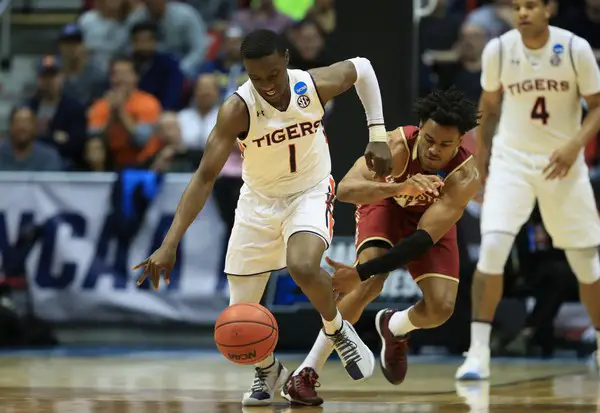Referees are the backbone of any sport. Without referees, sports games are reduced to lawlessness; players get away with fouling, and there are no consequences for breaking the rules. Nevertheless, referees make mistakes just like the rest of us.
Though they have an extensive knowledge of whatever sport they officiate, they still have to make split-second decisions which sports broadcasters may debate for several minutes. Even during March Madness, one of the biggest televised college basketball platforms, the referees can still make game-changing mistakes.
During the 2018 March Madness rounds of playoffs, there have been several referee blunders that could have changed the outcome of the game. Here are the most controversial referee mistakes so far in this year’s tournament.
Auburn vs. Charleston
On March 16, Auburn, the number four seed in the Midwest, narrowly defeated the number 13 seed Charleston in a 62 – 58 victory. With five seconds left on the clock and a score of 61 – 58 in favor of Auburn, Charleston’s Grant Riller took a three-point shot and missed. Many viewers believed that he was fouled on his shot, but no call came from it.
Then Chuma Okeke, an Auburn freshman, pulled in Riller’s three point rebound and was immediately fouled. Okeke tossed the ball to his teammate, sophomore guard Jared Harper. Harper took two shots from the free throw line; even though he only made one of the two shots, this shot won the game for Auburn.
Why does this matter so much? Okeke and Harper shot, respectively, 67 percent and 82 percent on free throws. With Harper taking the shots, Auburn had a far greater likelihood of making them.
Officials never caught the error during the game, which may have changed its outcome; if Okeke had taken the penalty shot instead of Harper, Auburn might not have scored those final three points. Furthermore, if Charleston could have regained possession after Riller was fouled, they might have managed to tie the score.
The NCAA even admitted the mistake. “Had any of the officials been aware of this, or had anyone alerted the officiating crew to the fact that the wrong player was at the foul line, the officials would have been able to review the play and determine [Okeke] should have been the shooter,” NCAA coordinator of officiating J.D. Collins said in a statement.
Florida State vs. Xavier
With five seconds left in the game, the score was 75 – 70 in favor of the ninth seed Florida State Seminoles. Even before the game ended, FSU players left the bench and stormed the court to celebrate the comeback that would lead them to victory over the number one seed Xavier.
However, most college basketball fans watching March Madness wondered why Florida State was not charged a technical foul. After all, the final buzzer had not yet sounded. The officials should have called a foul against FSU for having too many players on the court.
If the referees had made the call, the outcome of the game might have been different. With two shots and regaining of possession as the penalty for a technical, there was the opportunity for Xavier to bring the score to a tie, even with less than a minute left in the game.
By ignoring the foul, however, the referees denied Xavier this chance. This mistake in officiating ultimately caused a great upset in the March Madness brackets.
Marshall vs. Wichita State
In the first round of the 2018 March Madness bracket, the 13th seed Marshall University beat out the number four seed Wichita State in a surprising upset.
The Thundering Herd defeated the Shockers with a score of 81 – 75, though the entire game was a close battle right up until the end. In fact, it’s possible that the Shockers only lost due to an impulsive mistake by one of the referees.
During a key possession during the final quarter, the ball was called out of bounds against a Wichita State player and possession went to Marshall.
Making calls in real time can be difficult; officials cannot see all the angles like a playback camera can. Because of this, officials made the wrong call.
Even though the instant replay clearly shows that the ball touches the hands of a Marshall player before going out of bounds the call on the court stood and Marshall still got the ball. After this officiating blunder, the Herd took the inbound ball to the net and secured their victory.
Kentucky vs. Texas A&M
Early on in the tournament, the number 21 seed, Kentucky, beat Texas A&M in a one-point match. During the final four seconds of the game, the score was at 74 – 73. Then Kentucky’s P.J. Washington squared up to the free throw line to take a shot.
After he missed the shot, the ball bounced off the rim and Texas A&M recovered the defensive rebound which could have played out to a game-winning swoosh for the team. In a last-ditch attempt to win the game, Texas A&M passed the ball all the way down the court to Tyler Davis, who was standing right underneath the basket.
If Davis had scored two points from his shot, Texas A&M would have won the game. However, on the throw down the field, Wenyen Gabriel of Kentucky fouled Davis in an attempt to block the ball.
Still, the referees did not blow the whistle for a foul before the final buzzer. The Texas A&M Aggies fell to the Wildcats after a missed call by the officials, right in the middle of a key play that would have led the Aggies to victory.
Referees are humans and they are making split-second decisions. It’s entirely understood that a referee would sometimes make the wrong call. However, the official clearly made the wrong calls in these games, and those decisions changed the course of the game entirely.

















